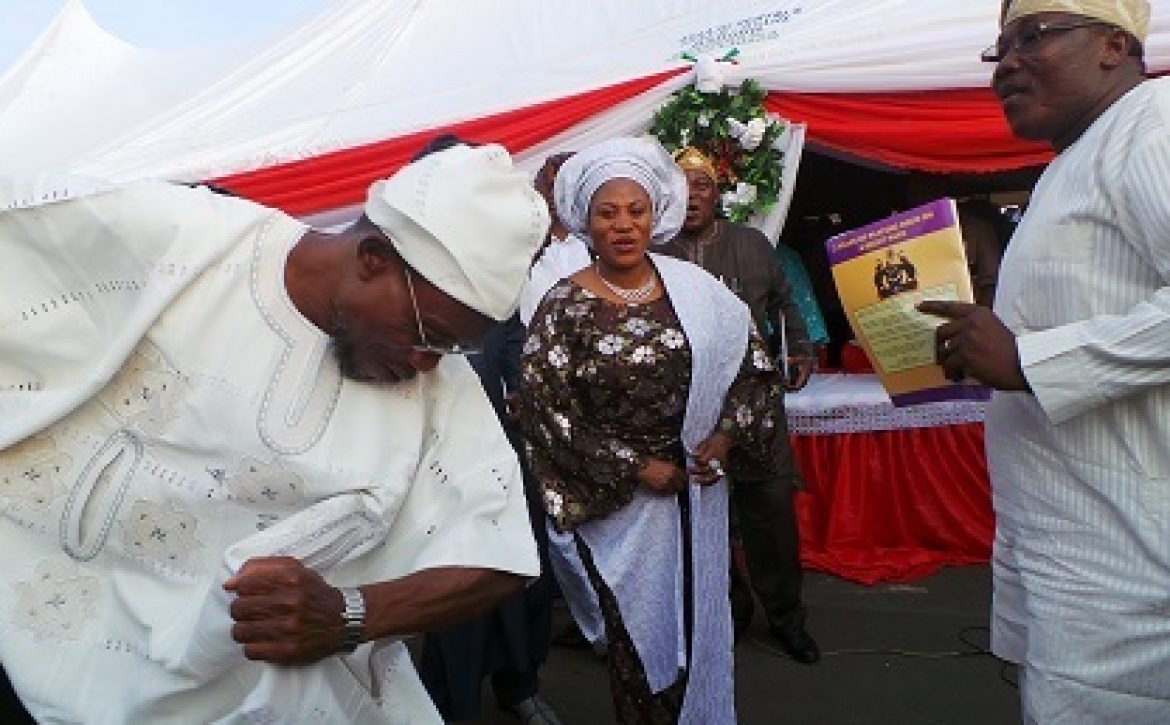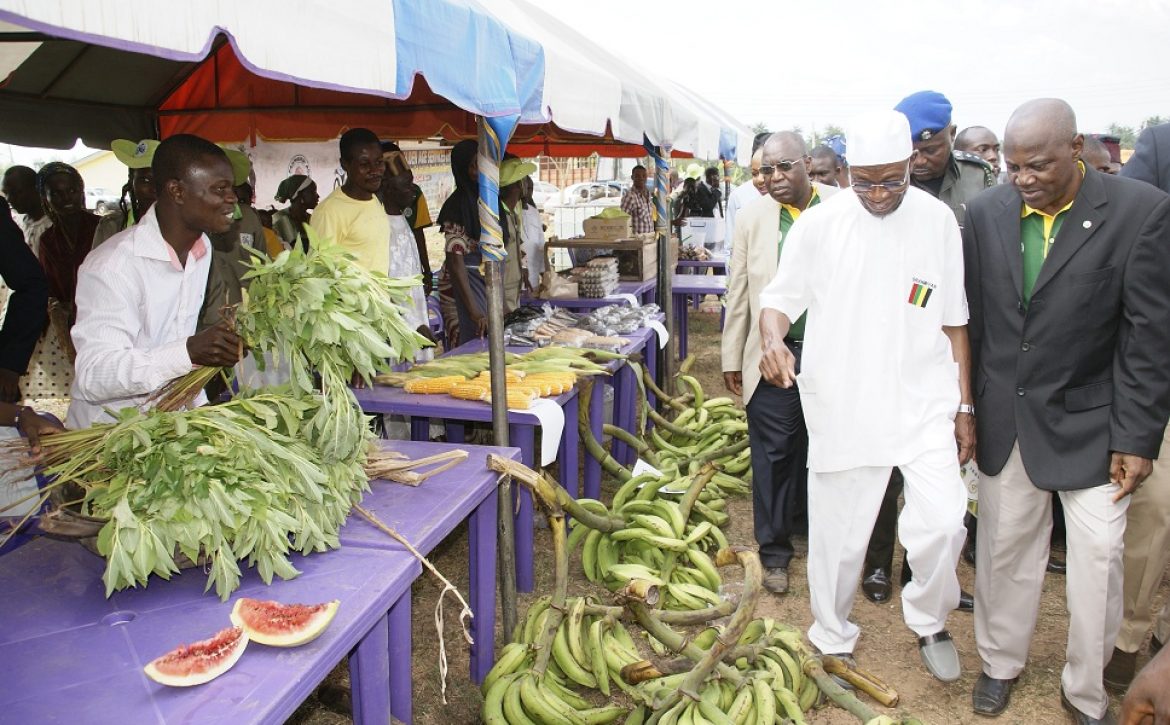Governor of the State of Osun, Ogbeni Rauf Adesoji Aregbesola’s much more criticized educational reforms have yet again been vindicated as a pupil from the State of Osun leads her contemporaries to win the coveted West African Examination Council, WAEC awards 2012 of best student.
The state of Osun’s Opon-imo, school feeding programme, reclassification of schools among others have in recent time gone through severe criticism from political enemies far and near. If this latest feat by a pupil from Osogbo is anything to go by, the doubters of Aregbesola should have a rethink.
Seventeen-year-old Folafoluwa Oginni of the State of Osun has emerged the overall best pupil in the May/June 2012 West African Senior School Certificate Examination. She led two other girls to lift the prestigious West African Examinations Council National Distinction/Merit awards.
By the feat, the Osogbo, Osun State-born lad has become the current holder of WAEC’s national distinction/merit award. The Council instituted the award in 1984 to encourage academic excellence.
Oginni, who attended Our Lady and St. Francis Catholic College, Isale-aro, Osogbo, with examination number 4303013/087, also had Grade 1 in Economics, Government, Literature-in-English, Biology, Christian Religious Knowledge and Yoruba Language and with a cumulative score of 653.9318.
culled from OSUN DEFENDER
Category: Politics
Oginni scored Grade 1 in all her eight subjects, including English Language and Mathematics.
By the feat, the Osogbo, Osun State-born lad has become the current holder of WAEC’s national distinction/merit award. The Council instituted the award in 1984 to encourage academic excellence.
Oginni, who attended Our Lady and St. Francis Catholic College, Isale-aro, Osogbo, with examination number 4303013/087, also had Grade 1 in Economics, Government, Literature-in-English, Biology, Christian Religious Knowledge and Yoruba Language. She has a cumulative score of 653.9318.
Born on December 13, 1995, she attended Folorunsho Memorial Nursery and Primary School, Oyan, Odo-Otin Local Government Area between 1999 and 2000 as well as St. Clare’s Nursery and Primary School, Isale-aro, Osogbo between 2001 and 2006.
With two books -The Joy and Agony of Reaping (2005) and the Despised Corner Piece (2008) – already to her credit, the youngster in 2009 came first in the Junior Category of International Digest Competition entitled “Raising IT champions for 2020.”
She also took the first position in the Caremi Essay Competition to mark the 2010 World Mental Health Day.
The young lad, whose feat has made OSCCO to become the 2012 winner of the Omo N’Oba Erediauwa trophy for producing the best female WASSCE candidate, won the second position in the junior category of the NAFDAC Consumer Safety Club Schools Competition in 2009.
She also came second in the competition in 2011 at the SSS category as well as third in the senior category of the International Digest 2010 contest.
Oginni is at present studying Law at the Obafemi Awolowo University, Ile-Ife.
On the Council’s second placed National Distinction/Merit award chart is 18-year-old, Oluwakemi Olalude.
Olalude, who garnered a cumulative score point of 649.3797, also obtained Grade 1 in all her eight subjects.
The Loyola Jesuit College, Abuja pupil with examination number 4020617/114, scored Grade 1 in English Language, Mathematics, Physics, Chemistry, Biology, Geography, Agricultural Science and the Christian Religious Knowledge.
She had her primary education at Plateau Private School, Jos between 1998 and 2006.
Hitherto, she emerged the LJC’s overall best graduating pupil for the 2005/2006 academic session, carting away prizes in French Language, Social Studies, Mathematics, Music and Vocational Aptitude.
All through her stay at LJC, she was on the college Honours Rolls having maintained an average of above 85 per cent in her subjects. She also won the LJC’s academic award for the best graduating female student of 2012 set.
The youngster, who represented LJC in the 2009 Mathematics Olympiad Competition while in Junior Secondary School Three, scored 11 distinctions and one credit in the Junior Secondary Certificate Examination in the same year.
Currently studying Medicine and Surgery at the University of Ibadan, the youngster born on May 8, 1995 had also emerged the best in a Mathematics competition organised by the Nigerian-Turkish International College for states in Plateau, Nasarawa and Taraba.
The third placed position went to Anambra State-born Chinelo Ibekwe. She also obtained Grade 1 in eight subjects, scoring a cumulative point of 647.9675.
She had her pre-primary and primary education at Home Science Primary School, and St. Saviours British Primary School, all in Ikoyi, Lagos, respectively.
Ibekwe, who attended Louisville Girls High School, Ijebu-Itele, Ogun State, scored Grade 1 in English Language, Mathematics, Further Mathematics, Physics, Chemistry, Biology, Geography and Agricultural Science.
Born on April 17, 1996, the Nimo, Anambra State pupil in 2009 emerged the second best JSCE candidate with 11A’s and 1C. She also obtained the third best International General Certificate of Secondary Education result in2012, scoring four stars and 2A’s.
The youngster, who received an award in 2012 for being a voluntary student tutor, again in 2011 and 2012 got an award for outstanding achievement in the American Mathematics contest.
She is at present studying Chemical Engineering at the University of Mississippi, United States.
To be considered for the 29-year-old distinction award, a candidate must obtain Grade 1 in at least seven subjects, including English Language, Mathematics, one of Physics, Chemistry and Biology, and one subject from any of the three sub-categories of core subjects.
In addition, the candidate must obtain a minimum of Grade 6 in at least one subject from each of the core subject sub-categories.
Candidates are considered under the Merit awards only if enough participants do not qualify for the distinction awards. The eligibility criteria for the Merit awards are the same as those of Distinction awards, except that a candidate must obtain a grade not lower than 2 in English Language.
The results of candidates eligible for an award should have been obtained at the first attempt and at the same sitting. The grades would also have been obtained without any hint of impropriety.
The first National Distinction/Merit awards were presented in Abeokuta, Ogun State in 1985 to the winners in the Nov/Dec. 1984 SC/GCE, with Abdulkadir Sarki-Abba, a pupil of Government Science School, Dawakin-Tofa, Kano State receiving the excellence award.
Since the first presentation, findings by our correspondent showed that pupils from Queen’s College, Yaba, Lagos, have won the prestigious award 10 times. By this accomplishment, the school has become the highest-winning institution as well as the highest recipient of the Oba Erediauwa trophy for presenting the best female candidates.
Suleja Academy, Suleja is the second highest-winning institution, picking the prize four times in 1992, 1994, 1997 and 2009, while International School, Ibadan, Oyo State has won it three times in 1987, 2000 and 2004.
Meanwhile, Queen’s College, Yaba has also won the Council’s Augustus Oyediran prize six times, while Loyola Jesuit College, Wuse, Abuja has won it five times in 2002, 2003, 2004, 2005 and 2008.
Suleja Academy, Niger State has won it four times in 1992, 1994, 1996 and 1997.
The Oyediran trophy is given to the school that has the best aggregate determined on the results of its best 50 candidates in English Language, Mathematics and one science subject.
Result details
Oginni
English Language 1
Mathematics 1
Biology 1
Economics 1
Literature in English 1
Government 1
Christian Religious Knowlegde 1
Yoruba Language 1
Olalude
English Language 1
Mathematics 1
Biology 1
Chemistry 1
Physics 1
Geography 1
Christian Religious Knowlegde 1
Agricultural Science 1
Ibekwe
English Language 1
Mathematics 1
Biology 1
Chemistry 1
Physics 1
Geography 1
Further Mathematics 1
Agricultural Science 1
PUNCH
Freedom Park in Osogbo, the Osun State capital,full of crowd yesterday to mark the third anniversary of the Governor Rauf Aregbesola administration. Aregbesola said he has delivered on his electioneering promises and pledged to continue to make life better for the people.
At the rally were Ekiti State Governor Kayode Fayemi; Osun State Deputy Governor Mrs. Titilayo Laoye-Tomori; Aregbesola’s wife, Serifat; Ekiti State Commissioner for Integration and Intergovernmental Affairs Funminiyi Afuye; top government officials and chieftains of the All Progressives Congress (APC).
Fayemi said the defection of the Alhaji Kawu Baraje-led faction of the Peoples Democratic Party (PDP) to the All Progressives Congress (APC) was a signal that the alternation of power at the federal level is imminent. He said democracy without alternation of power was “elected dictatorship”, hence the need to alternate power to make it meaningful.

Fayemi said APC was not the same with PDP. He described APC as a party of progress, development and revolution, adding that this led the aggrieved PDP leaders to the party.
He said their defection was “a political earthquake”.
Congratulating Aregbesola on his third anniversary in office, Fayemi described him (Aregbesola) as “a visionary leader, who has made positive development in all sectors”. He said Aregbesola deserved another term to complete his people-oriented programmes and urged the people to re-elect him.
Fayemi said he was not “unaware that the PDP is scheming and targeting” next year’s governorship polls in Osun and Ekiti states, adding that he and Aregbesola believed in the support of the people and would not accept a replication of the “anambracadabra election” that the Independent National Electoral Commission (INEC) conducted in Anambra in their states
Nation
Governor, State of Osun, Ogbeni Rauf Aregbesola; Group Managing Director, Odua Investment Company, Alhaji Adbayo Jimoh (right) and others, during the inspection of farm produce, at the graduation ceremony of Osun-Odua Farmers Academy at Ede in the State of Osun on Thursday 28-11-2013

Governor, State of Osun, Ogbeni Rauf Aregbesola; Group Managing Director, Odua Investment Company, Alhaji Adbayo Jimoh (right) and others, during the inspection of farm produce, at the graduation ceremony of Osun-Odua Farmers Academy at Ede in the State of Osun on Thursday 28-11-2013

Governor, State of Osun, Ogbeni Rauf Aregbesola; Group Managing Director, Odua Investment Company, Alhaji Adbayo Jimoh (right) and others, during the inspection of farm produce, at the graduation ceremony of Osun-Odua Farmers Academy at Ede in the State of Osun on Thursday 28-11-2013

State of Osun Deputy Governor, Mrs Titi Laoye-Tomori; Governor Aregbesola; Commissioner for Agriculture, Dr Wale Adedoyin; Overall Best Graduating O-Yes Student in Livestock/Fishery,, Mrs Adenike Akinbote and Group Managing Director, Odua Investment Company, Alhaji Adbayo Jimoh, during the inspection of farm produce, at the graduation ceremony of Osun-Odua Farmers Academy at Ede in the State of Osun on Thursday 28-11-2013

From left, State of Osun Deputy Governor, Mrs Titi Laoye-Tomori; Governor Aregbesola; Group Managing Director, Odua Investment Company, Alhaji Adbayo Jimoh ; Dr. Issac Akintade, representing Ondo State; Alhaji Tajudeen Bello, representing Ogun State; Chief Olajumoke Ogunkeyede, representing Osun and Executive Director of Odua Investment, Alhaji Niyi Badmus, at the graduation ceremony of Osun-Odua Farmers Academy at Ede in the State of Osun on Thursday 28-11-2013

Osun Oodua’s Farmers Academy; an agricultural institution established by the government of the State of Osun today held its graduation ceremony for its 2012/2013 batch.
In his goodwill message, the Governor of the State of Osun; Ogbeni Rauf Aregbesola commends the students and managements of the school for their enthusiasm towards the development of the State.
Governor Aregbesola noted that there is a big opportunity for them as young farmers in the country because according to the statistic made available by CBN, Nigeria is using about N600BN to import food every year and if only the ten percent of the food can be provided by the graduating farmers, it means a lot.
“Also in Lagos State, about N3BN is being expended on food on daily basis and if you can exploit that opportunity by providing the ten percent of foods needed in Lagos, it also mean a lot and even in the State of Osun, the meal that is being served at our elementary schools for the pupils of primaries 1-4 is a great opportunity that can be exploited by the graduating farmers” the governor said.
The governor then presented the certificate to the graduating students that performed excellently.
BIOREPORTS
As the administration of Ogbeni Rauf Aregbesola clocks three years in the State of Osun, the Special Adviser to the Governor on Environment & Sanitation; Hon. Bola Ilori has congratulated the people of the State on the benefits of democracy accrued to them in the spate of three years.
In a release by his media office today, Ilori stated that the people of the state have not had it so good in recent time when it comes to dividends of democracy.
“Aregbesola is indeed a blessing to the state of Osun, going by what we are witnessing today, in just three years, infrastructural developments are massive, road constructions are going on in every nook and crannies of the State, efforts on cleaner environment have reduced hospital patronage for diseases related cases by 50%, face-lifting of our environment through environmental renewal programme is on, farmers are getting soft loans and other inputs to carry on their businesses, no single case of flooding has been reported since the government dredged the streams and rivers in the prone areas when it came on board, schools are being constructed everywhere, enabling environment is being created for investors, jobs are being created, modern markets are being built and a whole lot more like that. The governor has indeed done well and we can only continue to pray for him for more success” the statement said.
Ilori then called on the people of the state to give more supports to the governor as it is the only thing that can guarantee continuous enjoyment of the dividends of democracy.
“Well as 2014 approaches which is the election year, we are urging our people to continue with their unflinching supports for Ogbeni so that we will all continue to enjoy the ongoing dividends of democracy like never before” the statement concluded.
BIOREPORTS
Distribution of free Education Materials by the Venezuelan Ambassador in the Country to Students in Public Schools, commemorating 3rd years Aniversary of Aregbesola’s Administration, at Anthony Udofia Elementary School, Osogbo, State of Osun on Wednesday 27-11-2013

From right, Governor State of Osun, Ogbeni Rauf Aregbesola; his
Deputy, Mrs Titi Laoye-Tomori; Minister Counselor, Embassy of the
Bolivarian Republic of Venezuela, Miguelangel Vecchia and wife of the
Governor, Alhaja Sherifat Aregbesola, at the Distribution of free
Education Materials by the Venezuelan Ambassador in the Country to Students in Public Schools, commemorating 3rd years Anniversary of Aregbesola’s Administration, at Anthony Udofia Elementary School,
Osogbo, State of Osun on Wednesday 27-11-2013

From left, Minister Counselor, Embassy of the Bolivarian Republic of
Venezuela, Miguelangel Vecchia; Ekiti State Governor, Dr Kayode
Fayemi; Governor State of Osun, Ogbeni Rauf Aregbesola; his Deputy,
Mrs Titi Laoye-Tomori and others, at the Distribution of free Education Materials by the Venezuelan Ambassador in the Country to Students of Public Primary Schools in Osun, at Anthony Udofia Elementary School, Osogbo, State of Osun on Wednesday 27-11-2013

From left, Minister Counselor, Embassy of the Bolivarian Republic of
Venezuela, Miguelangel Vecchia; Ekiti State Governor, Dr Kayode
Fayemi; Governor State of Osun, Ogbeni Rauf Aregbesola; his Deputy,
Mrs Titi Laoye-Tomori and others, at the Distribution of free
Education Materials by the Venezuelan Ambassador in the Country to Students of Public Primary Schools in Osun, at Anthony Udofia Elementary School, Osogbo, State of Osun on Wednesday 27-11-2013

From left, Deputy Governor State of Osun, Mrs Titi Laoye-Tomori; Governor Rauf Aregbesola; his Wife, Alhaja Sherifat Aregbesola and
Minister Counselor, Embassy of the Bolivarian Republic of Venezuela,
Miguelangel Vecchia, at the Distribution of free Education Materials
by the Venezuelan Ambassador in the Country to Students in Public
Schools, commemorating 3rd years Anniversary of Aregbesola’s Administration, at Anthony Udofia Elementary School, Osogbo, State of Osun on Wednesday 27-11-2013

From left, Deputy Governor State of Osun, Mrs Titi Laoye-Tomori; Governor Rauf Aregbesola; his Wife, Alhaja Sherifat Aregbesola and Minister Counselor, Embassy of the Bolivarian Republic of Venezuela,
Miguelangel Vecchia, at the Distribution of free Education Materials
by the Venezuelan Ambassador in the Country to Students in Public
Schools, commemorating 3rd years Anniversary of Aregbesola’s Administration, at Anthony Udofia Elementary School, Osogbo, State of Osun on Wednesday 27-11-2013

From right, Governor State of Osun, Ogbeni Rauf Aregbesola; Minister
Counselor, Embassy of the Bolivarian Republic of Venezuela,
Miguelangel Vecchia and Ekiti State Governor, Dr Kayode Fayemi, at the
Distribution of free Education Materials by the Venezuelan Ambassador
in the Country to Students in Public Schools, commemorating 3rd years
Aniversary of Aregbesola’s Administration, at Anthony Udofia Elementary School, Osogbo, State of Osun on Wednesday 27-11-2013

Governor State of Osun, Ogbeni Rauf Aregbesola; his Ekiti State
counterpart, Dr Kayode Fayemi and Minister Counselor, Embassy of the
Bolivarian Republic of Venezuela, Miguelangel Vecchia acknowledging
cheers from the Pupils, at the Distribution of free Education
Materials by the Venezuelan Ambassador in the Country to Students of
Public Primary Schools in Osun, at the Distribution of free Education
Materials by the Venezuelan Ambassador in the Country to Students in
Public Schools, commemorating 3rd years Anniversary of Aregbesola’s
Administration, at Anthony Udofia Elementary School, Osogbo, State of
Osun on Wednesday 27-11-2013
Governor Aregbesola’s Cup, marking the 3rd year Anniversary celebration of Aregbesola’s Administration, at Oba Olasore Oladele’s Royal Park, Playing Ground, Iloko-Ijesa on Tuesday 26-11-2013

Governor, State of Osun, Ogbeni Rauf Aregbesola, presenting a victory cup of 1-0 to nothing to the captain of Orolu Football Club in the State, Master Oladele Afolabi, With them are, Deputy Governor, Mrs Titi Laoye-Tomori; wife of the Governor, Sherifat; Speaker of the House of Assembly, Hon. Najeem salami; Secretary to the State government, Alhaji Moshood Adeoti and others, during a football competition between Ede South Football Club and Orolu Foothball Club, tagged: Governor Aregbesola’s Cup, marking the 3rd year Anniversary celebration of Aregbesola’s Administration, at Oba Olasore Oladele’s Royal Park, Playing Ground, Iloko-Ijesa on Tuesday 26-11-2013

Shows Football skills which ended in 1-0 in favour of Orolu, during a football competition between Ede South Football Club and Orolu Fooball Club, tagged: Governor Aregbesola’s Cup, marking the 3rd year Anniversary celebration of Aregbesola’s Administration, at Oba Olasore Oladele’s Royal Park, Playing Ground, Iloko-Ijesa on Tuesday 26-11-2013

Shows Football skills which ended in 1-0 in favour of Orolu, during a football competition between Ede South Football Club and Orolu Fooball Club, tagged: Governor Aregbesola’s Cup, marking the 3rd year Anniversary celebration of Aregbesola’s Administration, at Oba Olasore Oladele’s Royal Park, Playing Ground, Iloko-Ijesa on Tuesday 26-11-2013

Shows Football skills which ended in 1-0 in favour of Orolu, during a football competition between Ede South Football Club and Orolu Fooball Club, tagged: Governor Aregbesola’s Cup, marking the 3rd year Anniversary celebration of Aregbesola’s Administration, at Oba Olasore Oladele’s Royal Park, Playing Ground, Iloko-Ijesa on Tuesday 26-11-2013
 In line with its continuous corporate social investment drive, provider of premium pay-TV services on the DStv and GOtv platforms in Nigeria, MultiChoice said it had provided e-learning facilities for students of 10 public schools in Osun State to allow them have access to world-class learning facilities. The intervention, which comprises a TV set, a HD PVR decoder, satellite dish, a power generator, uninterrupted power system (UPS), a set of chairs and desks for the laboratory, among others, enables school children access educational TV channels.
In line with its continuous corporate social investment drive, provider of premium pay-TV services on the DStv and GOtv platforms in Nigeria, MultiChoice said it had provided e-learning facilities for students of 10 public schools in Osun State to allow them have access to world-class learning facilities. The intervention, which comprises a TV set, a HD PVR decoder, satellite dish, a power generator, uninterrupted power system (UPS), a set of chairs and desks for the laboratory, among others, enables school children access educational TV channels.
The channels, according to the company, include Discovery Channel, National Geographic, BBC Knowledge, BBC World, History Channel, Animal Planet and Mindset Learn, at no cost.
The novel intervention has been introduced to 245 schools in 24 states of the federation and has been proven to impact critically on the knowledge levels and understanding, especially of technical subject areas by students. It is now being extended to students of 10 public secondary schools in Osun State, bringing the total to 255 in 25 states across the country.
At a commemorative inauguration ceremony of the 10 new MultiChoice Resource Centres (MRC) held at Ataoja School of Science, Osogbo, recently, the company said the launch marked the commencement of the phase nine of the MRC project, which include scheduled launches in some select states which will soon be announced by the company. Head, Public Relations, MultiChoice, Mr. Segun Fayose in a release, said, “The resource centre initiative has grown from four centres at inception to 255 schools in 25 states of the federation.”
According to him, the technological, economic, socio-political advancement of any country has a direct correlation with its level of educational development and that the future of a country is intrinsically tied to the quality of education that the youths are exposed, a belief which informs MultiChoice’s roll-out of the audio-visual learning aid across the country.
In her address, the Deputy Governor of Osun State, Mrs. Titi-Laoye Tomori, who doubles as the Commissioner of Education in the state, lauded the company and its implementing partner, Innovative Technology Literacy Services Limited, for the initiative which she described as a veritable tool for the provision of valuable learning resource components for public schools in the country.
She noted that the launch of the project in Osogbo had put Osun as the 25th beneficiary state in the country, stressing that the partnership reaffirms the commitment of the state in providing qualitative education to the people of the state.
NATIONAL MIRROR

It was the grand finale of the maiden edition of the Governor Rauf Aregbesola golden cup as football lovers from all over the state thronged the playing ground of the Olasore International School, Iloko Ijesa for the final between 3FC of Orolu and Ede South FC.
The sports ground was filled to capacity as the Governor, his wife, Alhaja Serifat Aregbesola, the Deputy Governor, Mrs Laoye- Tomori, the Speaker of the state House of Assembly ,Rt. Hon. Najeem Salaam as well as other members of the state Executive council were all on ground to witness the final match between the two best teams of the competition.
The match started at a very frentic pace with both teams trying to outwit and unsettle the other in the early stages of the encounter as players of both teams did everything possible to register the first goal of the tension soaked match.
However, it was 3FC Orolu that got the curtain raiser after a goal mouth scramble and the defenders of Ede South Fc failed to clear their line and it was one nil in the first half.
Speaking during the half time break of the very interesting game, Governor Rauf Aregbesola of the state of Osun re-assured sport lovers in the state that the present administration will do everything within its power to elevate sporting activities in the state.
Governor Aregbesola who said sporting activities play a vital role in the development and health of the citizenry urged residents of the state to embrace love as sports is all about love and fair-play.
He called on well-meaning individuals in the state not to leave the responsibility of sports development to the government alone.
Ogbeni Aregbesola then praised the efforts of the Omoluabi Support Group who organised the competition and urged them to continue in their quest to promote sports at the grass root level.
The second half of the encounter started with Ede South Fc doing everything possible to quickly cancel the one goal deficit but Orolu fc players defended with all their might until the second goal of explosive game was scored in the dying minutes of the game so the game ended two goals to nil in favour of Orolu Fc which sparked joy and jubilation among their fans immediately the referee sounded the final whistle.
Meanwhile, the third-place match of the competition which had earlier been played between Ilesa West FC and Ede North FC ended in favour of Ede North FC by one goal to nothing.
The 3rd placed team went away with a sum of #300, 000 and a trophy presented by the Speaker of the state House of Assembly ,Rt. Hon. Najeem Salaam, 2nd placed team got #500,000 and a trophy presented by the state Deputy Governor ,Mrs Grace Laoye Tomori, while the winner carted away #1 million and a giant trophy presented by the Governor of the state of Osun, Ogbeni Rauf Aregbesola.
Individual awards were also presented to Bolatito Jegede as the Best Goal Keeper, Tijani Ismaila as the highest goal scorer, Kareem Sodiq won the Most Valuable Player award while Ilesa West FC won the Best Behaved Team award among others.
Other dignitaries present were the Paramount Ruler of Ijesa Land represented by two high chiefs, Chairman Uniq FM, Acting General Manager, Osun Sports Council, Special Adviser to the Governor on Youths Sports and Special Needs among others.
OSUN NEWS












